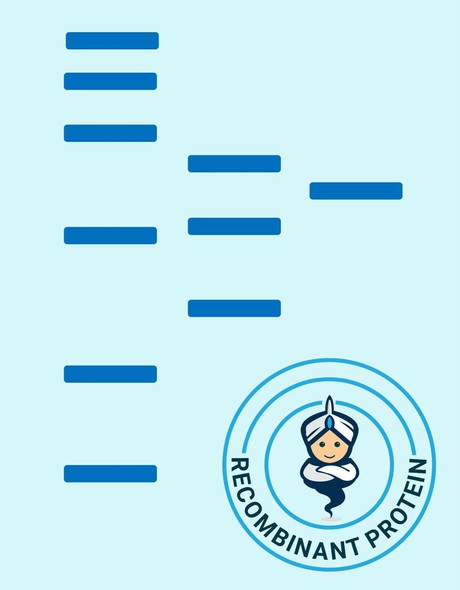Chemokines Recombinant Proteins
Human PF4 Recombinant Protein (RPPB1237)
- SKU:
- RPPB1237
- Product Type:
- Recombinant Protein
- Species:
- Human
- Uniprot:
- P02776
- Research Area:
- Chemokines
Description
| Product Name: | Human PF4 Recombinant Protein |
| Product Code: | RPPB1237 |
| Size: | 10µg |
| Species: | Human |
| Target: | PF4 |
| Synonyms: | CXCL4, PF-4, PF4, Iroplact, Oncostatin-A, SCYB4, MGC138298. |
| Source: | Escherichia Coli |
| Physical Appearance: | Sterile Filtered colorless clear solution. |
| Formulation: | PF4 protein solution (0.25mg/ml) contains 20mM Tris-HCl buffer (pH 8.0), 0.2M NaCl, 50% glycerol and 2mM DTT. |
| Stability: | Store at 4°C if entire vial will be used within 2-4 weeks. Store, frozen at -20°C for longer periods of time. For long term storage it is recommended to add a carrier protein (0.1% HSA or BSA).Please avoid freeze thaw cycles. |
| Purity: | Greater than 85.0% as determined by SDS-PAGE. |
| Amino Acid Sequence: | MGSSHHHHHH SSGLVPRGSH MEAEEDGDLQ CLCVKTTSQV RPRHITSLEV IKAGPHCPTA QLIATLKNGR KICLDLQAPL YKKIIKKLLE S |
Platelet factor-4 is a 70-amino acid protein that is released from the alpha-granules of activated platelets and binds with high affinity to heparin. Its major physiologic role appears to be neutralization of heparin-like molecules on the endothelial surface of blood vessels, thereby inhibiting local antithrombin III activity and promoting coagulation. As a strong chemoattractant for neutrophils and fibroblasts, PF4 probably has a role in inflammation and wound repair. Oncostatin-A is a member of the CXC chemokine family. Human PF4 is used for the proof of heparin-induced thrombocytopenia. Furthermore it is used as an inhibitor in the angiogenesis during tumor therapy.
PF4 Human Recombinant produced in E.Coli is a single, non-glycosylated polypeptide chain containing 91 amino acids (32-101 a.a) and having a molecular mass of 10kDa.PF4 is fused to a 21 amino acid His-tag at N-terminus & purified by proprietary chromatographic techniques.
| UniProt Protein Function: | PF4: Released during platelet aggregation. Neutralizes the anticoagulant effect of heparin because it binds more strongly to heparin than to the chondroitin-4-sulfate chains of the carrier molecule. Chemotactic for neutrophils and monocytes. Inhibits endothelial cell proliferation, the short form is a more potent inhibitor than the longer form. Belongs to the intercrine alpha (chemokine CxC) family. |
| UniProt Protein Details: | Protein type:Motility/polarity/chemotaxis; Apoptosis; Secreted, signal peptide; Chemokine; Secreted Chromosomal Location of Human Ortholog: 4q12-q21 Cellular Component: extracellular space; extracellular region Molecular Function:heparin binding; CXCR3 chemokine receptor binding; chemokine activity Biological Process: negative regulation of cytolysis; platelet activation; leukocyte chemotaxis; cytokine and chemokine mediated signaling pathway; positive regulation of leukocyte chemotaxis; response to lipopolysaccharide; positive regulation of cAMP metabolic process; positive regulation of tumor necrosis factor production; negative regulation of megakaryocyte differentiation; regulation of cell proliferation; G-protein coupled receptor protein signaling pathway; negative regulation of angiogenesis; platelet degranulation; negative regulation of MHC class II biosynthetic process; positive regulation of transcription from RNA polymerase II promoter; immune response; positive regulation of macrophage differentiation; inflammatory response; blood coagulation |
| NCBI Summary: | This gene encodes a member of the CXC chemokine family. This chemokine is released from the alpha granules of activated platelets in the form of a homotetramer which has high affinity for heparin and is involved in platelet aggregation. This protein is chemotactic for numerous other cell type and also functions as an inhibitor of hematopoiesis, angiogenesis and T-cell function. [provided by RefSeq, Mar 2012] |
| UniProt Code: | P02776 |
| NCBI GenInfo Identifier: | 130304 |
| NCBI Gene ID: | 5196 |
| NCBI Accession: | P02776.2 |
| UniProt Secondary Accession: | P02776,Q53X61, Q9UC64, Q9UC65, |
| UniProt Related Accession: | P02776 |
| Molecular Weight: | 10,845 Da |
| NCBI Full Name: | Platelet factor 4 |
| NCBI Synonym Full Names: | platelet factor 4 |
| NCBI Official Symbol: | PF4�� |
| NCBI Official Synonym Symbols: | PF-4; CXCL4; SCYB4�� |
| NCBI Protein Information: | platelet factor 4; iroplact; oncostatin-A; C-X-C motif chemokine 4; chemokine (C-X-C motif) ligand 4 |
| UniProt Protein Name: | Platelet factor 4 |
| UniProt Synonym Protein Names: | C-X-C motif chemokine 4; Iroplact; Oncostatin-ACleaved into the following chain:Platelet factor 4, short form |
| Protein Family: | Platelet factor |
| UniProt Gene Name: | PF4�� |
| UniProt Entry Name: | PLF4_HUMAN |






